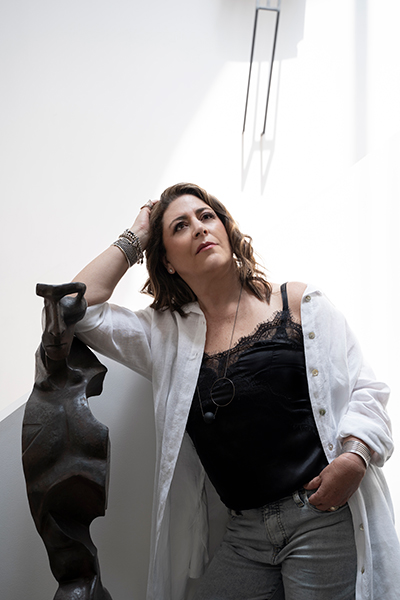Gabriela Ortiz

Born: 1964, Mexico City, Mexico
Born to a musical family, Gabriela Ortiz has always felt she didn’t choose music—music chose her. Her parents were founding members of the group Los Folkloristas, a renowned music ensemble dedicated to performing Latin American folk music. Growing up in the cosmopolitan Mexico City, Ortiz’s music education was multifaceted. While playing charango and guitar with her parents’ group, she was also learning classical piano. Ortiz began her composition studies under the mentorship of renowned Mexican composers Mario Lavista, Julio Estrada, Federico Ibarra, and Daniel Catán. Later, she continued her studies in Europe, earning a doctorate in composition and electronic music from London’s City University under the guidance of Simon Emmerson.
Ortiz’s music incorporates seemingly disparate musical worlds, from traditional and popular idioms to avant-garde techniques and multimedia works. This is, perhaps, the most salient characteristic of her oeuvre: an ingenious merging of distinct sonic worlds. While Ortiz continues to draw inspiration from Mexican subjects, she is interested in composing music that speaks to international audiences.
Gustavo Dudamel, a longtime champion of Ortiz’s music, stated: “Gabriela is one of the most talented composers in the world—not only in Mexico, not only in our continent—in the world. Her ability to bring colors, to bring rhythm and harmonies that connect with you is something beautiful, something unique.” Under Dudamel’s direction, the Los Angeles Philharmonic commissioned and premiered seven works by Ortiz in recent years, including her ballet Revolución diamantina, the violin concerto Altar de Cuerda, and Kauyumari for orchestra. Dudamel also introduced the piece Téenek (“one of the most brilliant I have ever directed”) to German audiences in 2023, performed by the Berliner Philharmoniker.
Ortiz’s music has been commissioned and performed by the New York Philharmonic, London Philharmonic Orchestra, National Orchestra of Bretagne, BBC Scottish Symphony Orchestra, The Royal Liverpool Philharmonic, São Paulo State Symphony Orchestra; Esa Pekka Salonen, Louis Langrée, and Carlos Miguel Prieto, among others. She has also collaborated with practically every orchestra, conductor, soloist, and ensemble in Mexico.
Her scores for dance, film, and theater—including the operas Only the Truth, Ana and her Shadow, and Firefly—frequently explore complex contemporary themes, like environmental concerns, racism, sexism, and globalization. She has written music for Errant Manoeuvres, performed by the Emma Diamond Dance Company at the Merce Cunningham Studio in New York; as well as the music scores for award-winning film Frontierland (produced and directed by Rubén Ortiz and Jessie Lerner) and Por la Libre (produced by Alta Vista films and directed by Juan Carlos de Llaca).
In 2022, Ortiz received the Bellas Artes Gold Medal, the highest distinction granted by the National Institute of Fine Arts. Other major awards include the National Prize for Arts and Literature, Guggenheim Memorial Foundation Fellowship, Fulbright-García Robles Fellowship, and two Latin GRAMMY nominations. She is a member of the prestigious Academy of the Arts and has been admitted to El Colegio Nacional, Mexico’s foremost circle of intellectuals.
Ortiz currently teaches at Mexico’s National Autonomous University and travels regularly to give courses and masterclasses at institutions throughout the Americas and Europe. Her music is published by Boosey & Hawkes.
Biography written with contribution from Ana Alonso Minutti
Téenek — Invenciones de Territorio
- Composed: 2017
- Premiere: October 12, 2017 by the Los Angeles Philharmonic conducted by Gustavo Dudamel
- CSO Notable Performances: These are the CSO’s first performances of this work.
- Instrumentation: 2 flutes, 2 piccolos (incl. alto flute), 2 oboes, English horn, 2 clarinets, bass clarinet, 2 bassoons, contrabassoon, 4 horns, 4 trumpets, 3 trombones, tuba, timpani, bass drum, bongos, claves, cowbells, crotales, crash cymbals, glockenspiel, gong, güiro, jawbone, maracas, marimba, snare drum, suspended cymbals, tam-tam, timbales, triangle, tubular bells, vibraphone, xylophone, celeste, piano, strings
- Duration: approx. 16 minutes
Téenek is the language spoken in the Huasteca region, which encompasses the states of Veracruz, Tamaulipas, San Luis Potosí, Hidalgo, Puebla and Querétaro in Mexico. Téenek means “local man,” in reference to all the men and women who belong to a place whose mere existence determines their destinations in time and space—their territories. Indeed, in any region of the world, human beings from any given era determine a way of BEING that transcends through time and defines their relationship with their surroundings, no matter their race, skin color, political borders or socio-economic condition. We are all mortals, just as our domains, differences, borders and possessions will eventually disappear, if not in decades, over the course of centuries. In the end, human beings transcend such conditions and circumstances by simply BEING, by culturally existing, by everything that remains.
Téenek is a sonorous metaphor of our transcendence, a strength that alludes to a future where there are no borders, but rather, a recognition of the actual particularities and differences between us that propitiate our development, while at the same time enriching and uplifting us. Music thus bears witness to a gradual history of matches and mismatches, of ancient cultures and new symbols, of ways to resist and comprehend the world by imagining sounds and senses, of that vital rhythm that lends meaning to the sense of belonging and roots that identify us culturally. Through the plain and simple idea of fitting in, of not dividing but rather recognizing otherness, Téenek reflects on the importance of reaffirming identities through fragmentation.
It is precisely because of this that Téenek is composed of a series of apparently dissimilar inventions, which find their strength in their differences, enrichment and musical development: these are interwoven and transformed over time in a discourse that demonstrates how the existence of borders may be diluted in pursuit of the powerful idea that our potential future lies in recognizing our differences.
— Alejandro Escuer